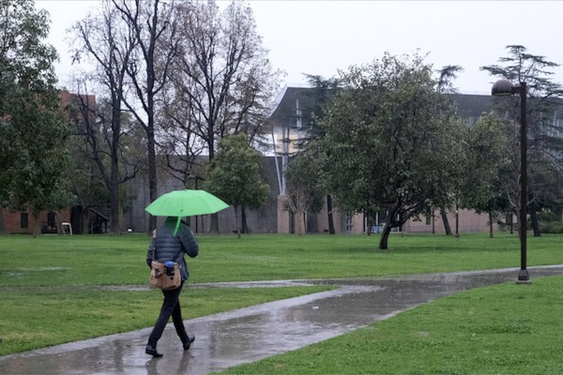Most college students are participating in their first presidential election, and this year’s tight race could quite possibly change the direction of our country forever.
Since students arrived back at school, you can’t walk through campus without being mauled by people from various groups harassing you to register to vote. Organizations such as CALPIRG (the California Student Public Interest Research Group) have been advocating student action for the future and the importance of the student vote. CALPIRG has been encouraging students to register to vote through studentvote.org, where they can fill out an application to vote in California or their home state.
Early voting, whether through absentee ballots or mail-in, is very prominent in this election. Many students who go to school in different states register for an absentee ballot and therefore, can vote as soon as they receive it.
Also, students who are already registered in their hometowns can have their ballot mailed to them and can vote before the Nov. 4 deadline as well. In California, students can send in their ballot as early as 29 days before the election.
Also at college campuses across the country, young celebrities are coming out and encouraging students to vote and get involved. At the largest university in the country, Ohio State, the nearby Obama campaign office is offering students a ride to polling locations to encourage them to vote.
However, many students dislike heavy weight being placed on them to register and vote in this election.
Tracy Oppenheimer, a sophomore journalism student as USC, says, “The extreme pressure placed on kids to vote is just too much. Voters should be educated, and if they’re not educated, then they really shouldn’t vote.”
This election year, the candidates are taking the election to a whole new level technologically with heavy campaigning over the Internet through social networking sites. On Facebook, one can use the ‘Sponsor’ application to send gifts such as campaign buttons to their friends to show support for their desired candidate. At UCLA, many Facebook groups have popped up, such as a Greeks for Obama.
While Obama seems to be increasingly popular among students and young adults, don’t be fooled by the overwhelmingly liberal reputation of Southern California. McCain has a large following among students as well.
At USC, the Students for John McCain hold weekly debate luncheons. Students can come during their breaks and hear the various viewpoints of each candidate argued. Issues such as the Iraq War, taxes, foreign policy and the economy are popular topics.
The Annenberg School for Communication at USC has also held large-scale TV-watching events for all of the important political debates and forums.
The current state of our economy is one of the biggest issues that effect college students. Graduating seniors across the country worry that with the threat of our economy entering into a depression, the job market will continue dwindling. Students worry that their entry-level salaries may not be able to keep them afloat. Students are also concerned by the increasing prices of basic consumer goods that are making life more difficult.
Another important issue in California is the debate over Proposition 8, which is trying to eliminate the right of same-sex couples to marry and initiate a constitutional amendment against it. In May 2008, four judges in San Francisco overturned the people’s vote (61 percent said marriage should only be between a man and woman), claiming that denying gay marriage violated the equal protection clause of the constitution.
This controversial issue will not only have fiscal effects on taxes, but it will have a large effect on the gay and lesbian community on college campuses where LGBT groups are strong. Prop 8 is stirring up the ever-present question of equality under the law and the recurrent debate of the separation between church and state.
As with every election, despite everything it is often hard to encourage the younger generation to turnout at the polls. Yet this year, people may be surprised. The fragile economy and the war on terror directly affect students, who despite what people may say, do care about the state of affairs of their country.



